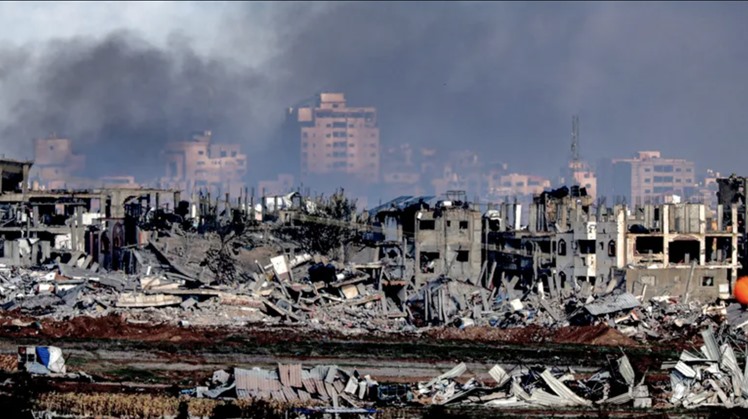By: Mohamed Abdel-Azim El-Shimi
Egypt is playing an important role in enhancing security and stability in the Arab region, in general, and is seeking to restore stability to the situation in the Gaza Strip, in particular.
This is based on the experience that Egypt has gained in crisis management, and its ability to take the lead and defend Arab national security within the framework of the vision of the Egyptian political leadership that made Egypt the most capable of resolving crises.
In this regard, many experts confirm that Egypt has now possesses international weight that makes it the most capable engine of resolving crises, thanks to the experience and ability of President Abdel-Fattah El-Sisi, as evidenced by the pivotal and important role that Egypt has been playing since Israel launched its aggression against the Gaza Strip this October.
Indeed, Egypt has been intensifying efforts to de-escalate the situation and has succeeded in mediation efforts that led to the release of two foreign detainees in Gaza.
The Egyptian foreign policy approach for managing the crisis in Gaza stem from the standpoint of Egypt’s great responsibility towards the Palestinian Cause.
Egypt seeks to diffuse the crisis in Gaza through a ceasefire and delivering the required aid to the people.
Egypt is moving in all security, political and strategic directions to find solutions to the crisis in the Gaza Strip.
This course of action, which is being applied based on the principles of the Egyptian position, aims to stop the Israeli aggression on the Gaza Strip and not just ensure the releasing of detainees.
It reflects that the Egyptian leadership is moving with responsibility and commitment through paving the way for a ceasefire, to be followed by confidence-building efforts between Egypt and the international community.
It is important to remind here that there are basics to the Egyptian strategy in dealing with the Palestinian Cause since the Egyptian vision always seeks to activate the two-state solution, move from a state of war to de-escalation, and present the Palestinian Cause to the international community.
Accordingly, the independence of the Egyptian action decisions in this crisis reflects a high degree of defending against the threat to Egyptian national security from any external plans.
Therefore, any extrapolation of Egypt's current position reflects a clear independence in its decision-making process - without any interference from external parties - especially with regard to the Rafah border crossing with the Gaza Strip, which has become open under Egyptian controls to deliver humanitarian aid to the strip.
Similarly, the Egyptian leadership is making strenuous efforts to release detainees in Gaza as an extension of the Egyptian role and efforts to bring peace to the region and ensure that the Palestinian people obtain their right to establish an independent Palestinian state on the borders of June 1967, which has been one of the constants of the political leadership over the course of decades.
On the other hand, Egypt holds the reins regarding the search for solutions to the Palestinian Cause through its endeavor to spread peace not only in the Arab region but also in the entire world.
The Egyptian state has never arrived late in supporting the Palestinian Cause, whether in times of peace or war.
Indeed, Egypt was keen to support the cause by helping to establish the Palestine Liberation Organization (PLO) in 1964.
This came at the conclusion first Arab-Palestinian Conference that was held in Jerusalem June 1964 as per the resolutions adopted by the Arab Summit earlier in January of that year, which mandated the creation of a formal representation for the Palestinians in international forums.
The PLO gained status as an observer in the United Nations after peace negotiations and the signing of the Oslo Peace Accords in 1993, and, accordingly, the organization gained recognition as a legitimate representative of the Palestinian people.
Egypt certainly wants the Palestinian people to have their own state and enjoy full sovereignty over their land without the interference of Israeli occupier in security affairs, denial of access to food, cutting off electricity or other such crimes as being currently committed against the Palestinian people.
Also, the Cairo Summit for Peace, which was called for by Egypt and held at the New Administrative Capital on 21 October, confirmed the pioneering role that Cairo plays in the region; reflected Cairo's importance to the international community; and highlighted that Egypt has a firm hand on the rudder in leadership.
Indeed, Egypt has contributed to creating a more objective public opinion towards the Palestinian Causes and a kind of sympathy towards the people in the Gaza Strip.
All of this would contribute to containing the ongoing escalation within the Gaza Strip.
In addition, the Egyptian state was able to clarify the opinion of the Egyptian and Palestinian people on the issue of displacement to Sinai, and the seriousness of this matter to the fate of the Palestinian Cause, which represents the foremost issue for Arabs.
Egypt was able through all its efforts since the beginning of the Israeli aggression on the Gaza Strip to clarify its position to the whole world.
This was done not only through its efforts in the Cairo Summit for Peace peace but also all its other efforts since the beginning of the crisis.
This gathering at the Cairo Summit for Peace at the New Administrative Capital, which included many international organizations and different countries, was presented the situation inside Gaza and the dimensions of the Palestinian Cause through Egypt.
The summit confirmed that Egypt plays a truly pivotal role in the Arab world.
 Thu, Jan. 4, 2024
Thu, Jan. 4, 2024